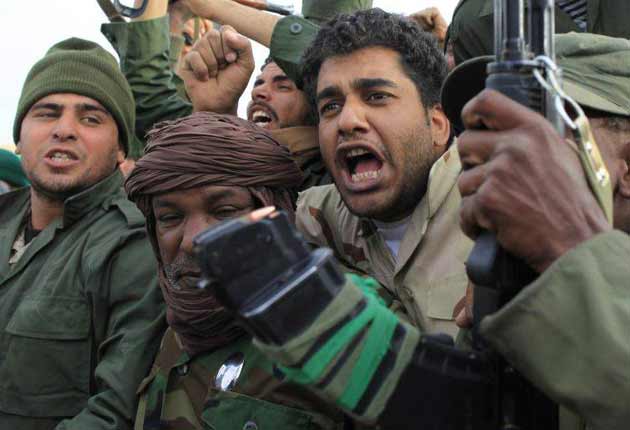Tripoli: Unreal sense of defiance in a capital cut off from the world

Your support helps us to tell the story
From reproductive rights to climate change to Big Tech, The Independent is on the ground when the story is developing. Whether it's investigating the financials of Elon Musk's pro-Trump PAC or producing our latest documentary, 'The A Word', which shines a light on the American women fighting for reproductive rights, we know how important it is to parse out the facts from the messaging.
At such a critical moment in US history, we need reporters on the ground. Your donation allows us to keep sending journalists to speak to both sides of the story.
The Independent is trusted by Americans across the entire political spectrum. And unlike many other quality news outlets, we choose not to lock Americans out of our reporting and analysis with paywalls. We believe quality journalism should be available to everyone, paid for by those who can afford it.
Your support makes all the difference.The crowd of a few dozen watching the young men with their green bandanas gyrating their hips yesterday afternoon to the raucous strains of a nationalist song in Tripoli's Green Square was a little smaller than three days earlier.
And here, beneath the fortress wall from which Muammar Gaddafi had issued his bloodcurdling call to arms three weeks ago, it was even possible to imagine it was a shade more subdued.
Perhaps it was too fanciful to see the reason for this apprehension as the UN vote on military intervention. The pro-Gaddafi groups were on the streets hours before the vote – and hours before their government had begun to warn they would take bloody revenge across the Mediterranean if the UN decided to attack.
But even before those fierce statements, there were signs that the rebels had more reason to hope than might have been supposed. Yesterday's reports of fierce fighting in Ajdabiya, a strategic gateway to the rebel strongholds in Benghazi and Tobruk, belied the jubilant rally Gaddafi supporters had staged on Tuesday evening. They had assembled then to mark the news, premature as it turned out, that Ajdabiya had been taken.
Those same young men are willing the opportunity to celebrate even more noisily for the fall of Benghazi. But if you watch only Libyan State TV, and with no internet across much of the city, it is possible to believe almost anything about what is happening outside the capital: that al-Qa'ida and foreign fighters are the only enemy, that there are no Libyan air strikes on Libyans, and, of course, that victory in Benghazi, in Saif Gaddafi's words on Wednesday, is less than 48 hours away. And that if Libyans are involved it can only be from motives of greed and power. "If they loved Libya, they would not fight it," said Majdi Daba, 44, one of those taking part in the round-the-clock pro-Gaddafi demonstration.
Of the banners in the square the most ominous said in French: "On land and sea, it will be a fire that burns the enemy." Most of these beliefs were evident at a government-arranged meeting with tribal leaders in Ben Ghasheir, 15 miles south of Tripoli.
"This is a summer cloud that will pass quickly," Said Ali Said, an elder of the Sidisaya tribe, said of the uprising, before denouncing the idea of a no-fly zone. "We refuse interference from outside. We take it as a new colonisation. We will defend ourselves and we will cause so many losses in those countries."
The souk tells another story, too. Even if the traffic is a little lighter than before the crisis, there are still jams and life in much of the city seems normal on the surface. But in the jewellery quarter a majority of shops were shuttered. While most shopkeepers were deeply reluctant to talk for long to foreigners, one said: "There is tension in the air. Business is down anyway and while there is a crisis, people do not want to open."
A mobile phone salesman said that even in Tripoli activity now ceased at the market by 7pm and that in "Benghazi there is a big problem". How long would it last? "A month," he said. True or not, given Saif Gaddafi's predictions, it seemed positively subversive.
Join our commenting forum
Join thought-provoking conversations, follow other Independent readers and see their replies
Comments